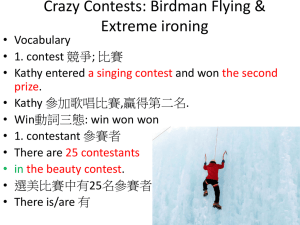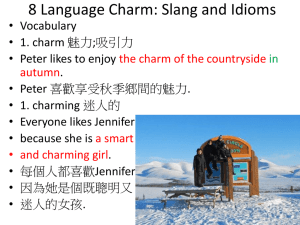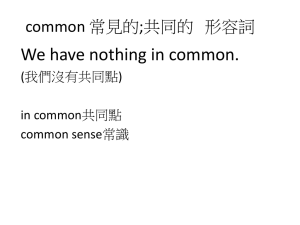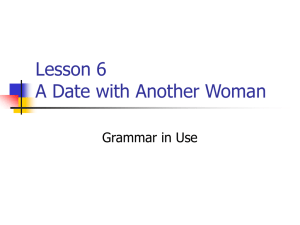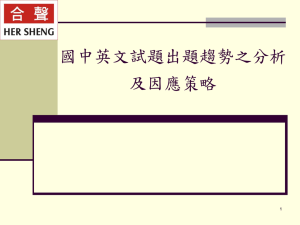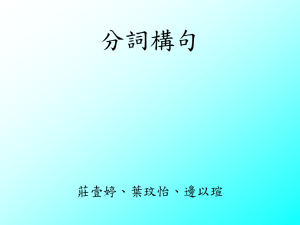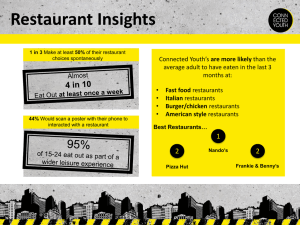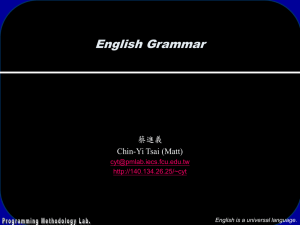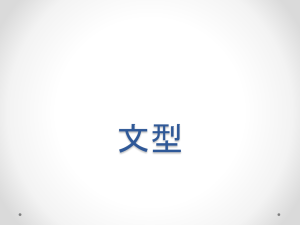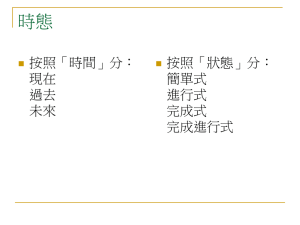Eating Customs around the World
advertisement
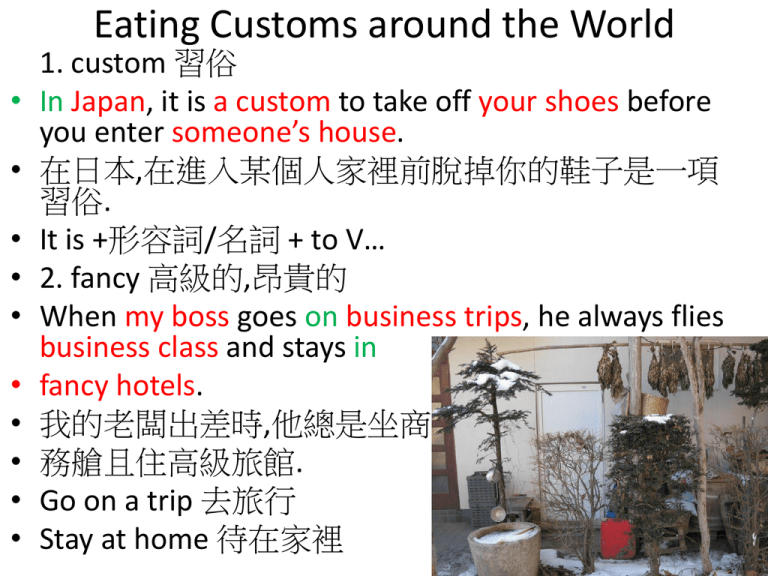
Eating Customs around the World • • • • • • • • • • 1. custom 習俗 In Japan, it is a custom to take off your shoes before you enter someone’s house. 在日本,在進入某個人家裡前脫掉你的鞋子是一項 習俗. It is +形容詞/名詞 + to V… 2. fancy 高級的,昂貴的 When my boss goes on business trips, he always flies business class and stays in fancy hotels. 我的老闆出差時,他總是坐商 務艙且住高級旅館. Go on a trip 去旅行 Stay at home 待在家裡 • • • • • • • • • • • 3. local 當地的;本地的 The local people depend on fishing for their living. 當地居民靠捕魚維生. Depend on 依靠 4. praise 讚美;讚揚 The coach praised his players for their great performance in the competition. 教練誇獎他的球員在比賽中表現優異. Although Gina failed to win a prize in the English speaking contest, her teacher gave her plenty of praise and encouragement. 雖然Gina 未能在英語演講比賽中獲獎,但她的老師 還是讚美和鼓勵她. Fail to V 不能 Plenty of 很多 • 5. chef 主廚 • That chef has a lot of talent. You will enjoy everything he cooks. • 那位廚師相當有天分,你會喜歡他煮的所有東西. • Everything he cooks 名詞 + 關係子句 • 6. unique 特有的 • Kangaroos and koalas are unique • to Australia. • 袋鼠和無尾熊是澳洲所特有的. • 7. practice 實行 • The custom of foot-binding was practiced in China from the 10th to the early 20th century. • 中國在西元十世紀到二十世紀初實行裹小腳習俗. • Was practiced (be + 過去分詞) 被動式 • 8. accidentally 偶然地;意外地 • I left home in a hurry this morning and accidentally locked myself out of the house. • 我今天早上匆忙地離家,且意外地把自己鎖在門 外. • Out of the house / outside the house • 8. accident 意外 • Luckily, no passengers got hurt in the car accident. • 很幸運,沒有乘客在這場車禍中受傷. • Get 動詞三態: get got got • Get + 形容詞/過去分詞 • Get involved/angry/hungry/fat/bored/dressed/ married/ready/late/started • 9. embarrassed 感到困窘的;感到尷尬的 • I felt embarrassed when I could not answer questions in class. • Feel + 形容詞/過去分詞 • 人 + be + embarrassed 人感到困窘 • Look/sound/smell/taste/feel + 形容詞 (Look/sound/smell/taste/feel)+like +名詞 • 9. embarrass 使困窘;使尷尬 • The questions about his private life embarrassed the president. • 關於他私生活的問題讓總裁很尷尬. • 9. embarrassing 使人尷尬的 • Singing in public is embarrassing to me. I am just too shy for this. • 在公開場合唱歌讓我很尷尬.我太害羞無法公開唱歌. • V+ing 是名詞或形容詞 • 事情 + be + embarrassing • 人 + be + embarrassed. • For 適合於 • 9. embarrassment 窘境;尷尬 • • • • My sister’s face always turns red with embarrassment when she performs on stage. 我姐姐在台上表演時,她的臉總會因為尷尬而變紅. Turn 變成(某種狀態) +形容詞 • • • • • • • • • • • • • 10. shameful 丟臉的 It is shameful to cheat on a test. You should never do it. 考試作弊是可恥的是,你永遠都不應該做這它. It is + 形容詞 + to V… 10. shame 憾事;倒楣的事 What a shame! You missed a wonderful show. 真可惜! 你錯過了很棒的表演. 11. reserve 保留 The judges may reserve their comments until all the performances are done. 評審會保留她們的意見到所有表 演結束. Do 動詞三態: do did done Are done (be + 過去分詞) 被動式 • 11. reservation 預訂; 預約 • If you want to eat in that popular restaurant on the weekend, you need to make a reservation. • 如果想要在週末時去那家受歡迎的餐廳吃飯,你 需要預約. • 12. wipe 擦拭 • Wipe your hands on a clean towel before you eat. • 在吃東西前用乾淨的毛巾擦拭妳的手. • 13. traditional 傳統的 • It is traditional for Americans to eat turkey on Thanksgiving. • 在感恩節吃火雞是美國人的傳統. • It is + 形容詞 + for +人 + to V… • 13. tradition 傳統 • The Chinese have a long tradition of cleaning their houses before Lunar New Year. • 長久以來,華人在農曆年前有大掃除的傳統. • Phrases 片語 • 1. as…as possible 盡可能.. • Try to talk about yourself as much as possible because we want to know you better. • 試著盡可能多講 • 一些關於你自己 • 的事,因為我們想 • 要更了解你. • 2. be regarded as 被認為是 • Taiwan is regarded as one of the most high-tech countries. • 台灣被認為是最高科技的國家之一. • Is regarded (be + 過去分詞) 被動式 • 3. keep an eye out for 注意;留意 • Please keep an eye out for the bus. We have to wait another hour if we miss it. • 請留意公車,如果我們錯過這班就必須要再等一小時. • 4. stay out of 躲開;避開 • My skin tans easily, so I try to stay • out of the sun as much as possible. • 我的皮膚容易曬黑,所以我試著盡 • 量避開太陽. • Reading 閱讀 • In Taiwan, it is common for people to bring their pets into some restaurants. • 在台灣,人帶寵物到某些餐廳是普遍的. • It is + 形容詞 + for +人 + to V… • Some of these restaurants even serve food just for animals. • 有些餐廳甚至提供動物食物. • But imagine you are having dinner in a fancy restaurant in an Arab country like Sudan. • 但想像一下,你正在某過像是蘇丹的阿拉伯國家的 高級餐廳用餐. • Should you bring your camel in with you? • 你會帶駱駝進餐廳嗎? • The answer is NO! This is just one example of different eating customs. • 答案是不! 這只是一個不同飲食習慣的例子. • There are more to be found around the world. • 世界上還有更多的例子等待被發現. • Find動詞三態: find found found • Be found (be + 過去分詞) 被動式 • Perhaps many of you have had ramen before. • 你們許多人之前可能都吃過拉麵. • Have had (have + 過去分詞) 完成式 • Noodle dishes, such as ramen, are • popular in Japan. • 麵食,像是拉麵,在日本是很受歡迎的. • If you walk into a local restaurant in Tokyo, you may hear a very special noise. • 如果你走進一家東京當地的餐廳,你可能會聽到很 特別雜聲. • The Japanese like to slurp their noodles as loudly as possible when they eat. • 日本人在吃麵時,喜歡盡可能地發出聲音. • Slurping noodles is a way of praising the chef. • 吃麵發出聲音是一種讚美廚師的方式. • It means that you like your food very much, and that you can’t wait to get it in your mouth! • 它意味著你非常喜歡你的食物,且迫不及待將它們 放進嘴裡! • It means (that) + 子句 • Noisy eating is not unique to Japan. • 吃東西發出噪音並不是日本獨特的. • It is also practiced in cheaper and smaller restaurants in China. • 在中國一些較便宜, 較小的餐廳裡也有同樣的習慣. • Is practiced (be + 過去分詞) 被動式 • Some Chinese burp loudly after their meals. • 有些華人在用餐後會大聲地打嗝. • Burping is a way of saying thanks for an excellent meal. • 打嗝是一種對美食表達感謝的方式. • So the next time you burp accidentally in a local restaurant in China, don’t feel too embarrassed! • 所以下次你在中國當地的餐廳不小心打嗝時,別感到 尷尬. • Feel + 形容詞/過去分詞 • We all know that Americans eat fried chicken and burgers with their hands. • 我們都知道美國人用手吃炸雞和漢堡. • S + know + that +子句 • And there are other people in the world who eat all of their meals without spoons, forks, or chopsticks. • 而世界上還有其他人吃東西不用湯匙叉子或筷子. • Who 關係代名詞 代表 people • People in the world eat all of their meals 變成關係子句 • Arabs, for instance, eat with their fingers. • 舉例來說,阿拉伯人用手指抓東西吃. • They sit close together and share food from a common bowl. • 他們僅坐在一起,而且從共同的碗裡分享食物. • Close together 靠在一起 • Besides Americans and Arabs, Indians also eat with their hands. • 除了美國人和阿拉伯人外,印度人也用他們的手拿東 西吃. • They usually use the fingertips of their right hand to eat. • 他們通常用右手的指尖抓東西吃. • However, it is shameful to use your left hand to touch your food. • 然而,用你的左手去碰食物是非常丟臉的. • It is + 形容詞 + to V… • The left hand is regarded as the dirty hand because it is reserved for wiping yourself after you use the restroom. • 左手被認為是髒手,因為左手在上完廁所後是要擦是 你自己的. • Is regarded ( be + 過去分詞) 被動式 • Is reserved ( be + 過去分詞) 被動式 • Remember not to use your left hand when you eat in a traditional restaurant in India. • 在印度的傳統餐廳用餐時,記得不要用左手. • Not to V 不定詞的否定 • The world is full of interesting eating customs. • 世界上充滿了有趣的飲食習慣. • Keep an eye out for the local customs in places that you visit, and stay out of awkward situations! • 留意你所造訪之地的當地習慣,並且避開尷尬情 況. • That 關係代名詞 代表 places • ( You visit the places) 變成關係子句 • Speaking—Different Tipping Culture • Kate took Sean, her new friend from America, to a restaurant. • Kate 帶她美國來的朋友Sean 到餐廳用餐 . • Wow! That was the best dinner I’ve ever had. • 哇,那是我吃過最棒的晚餐了. • I’ve ever had the dinner 改成關係子句 • I told you this restaurant is really good. • 我早就跟妳說過這間餐廳很棒. • Let me thank you by paying for the dinner. • 讓我付這頓晚餐前來感謝你. • Let 使役動詞 + O + 原形動詞 • That’s really nice of you. • 你人真好. • How much should I add for the tip? • 小費我應該要付多少? • You don’t have to do that, the bill already includes the service charge. • 妳不需要這麼做,帳單已經包含了服務費. • Have to 必須 • In some restaurants, they don’t even charge for the service. • 某些餐廳甚至不收服務費. • That’s really different from what we do in America. • 這和我們美國的做法非常不一樣. • What do we do?疑問句 • what we do 名詞子句 what to do名詞片語 • We usually tip 10 to 20% depending on the quality of service. • 我們通常要給10 到20%的小費,這要根據服務的品質而定. • Depend on 根據 • I guess every country has a different tipping culture. • 我猜每個國家都有不同的小費文化吧. • I guess that + 子句 • You can say that again. • 你說的沒錯.
